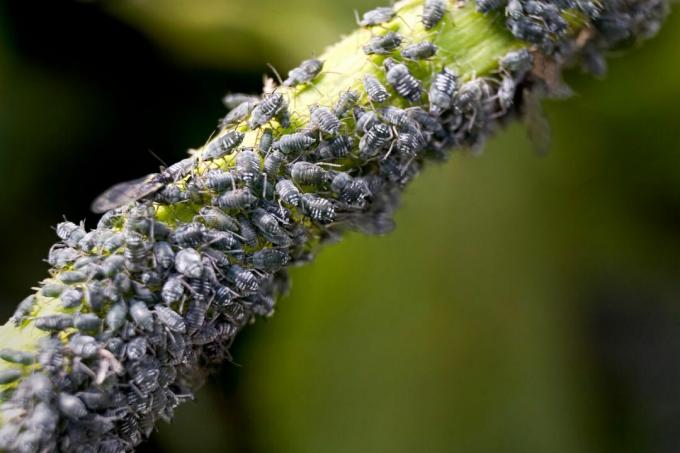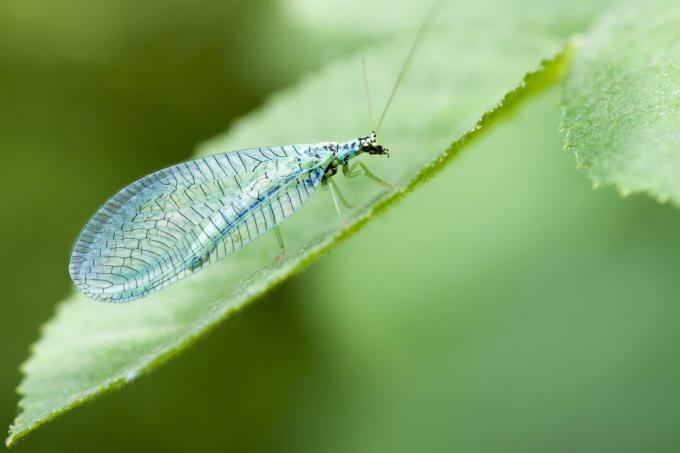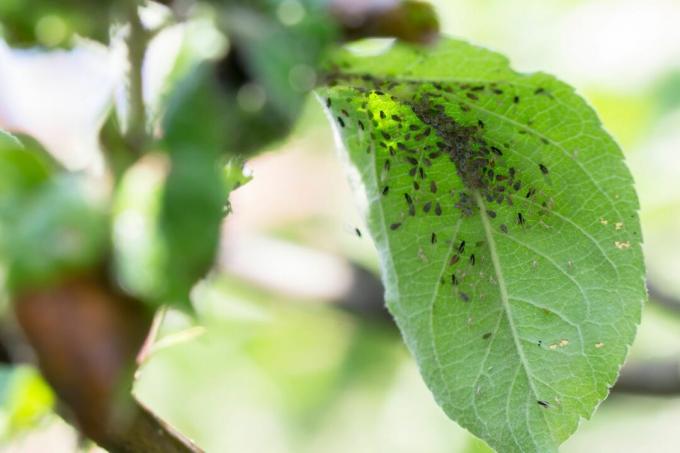There are a variety of ways to remove aphids. We reveal how to combat aphids on plants naturally and show the advantages of biological aphid control.

A single aphid is not a problem, but mass reproduction often occurs. Why this is and other interesting facts about aphids can be found in our Profile on aphids. The sucking pests can greatly weaken your plant. In this article, we will show you what options are available to you to get rid of the pests.
contents
-
Combat aphids: the best remedies at a glance
- Combat aphids naturally: biologically and without chemicals
- Combat aphids with beneficial insects
- Fight aphids with chemical agents
- Prevent aphids
Combat aphids: the best remedies at a glance
There are a number of ways to combat aphids. Some remedies work well, while others are less effective. Here you will find an overview of the targeted use of beneficial insects, household remedies, biological sprays and chemical agents.
Combat aphids naturally: biologically and without chemicals
There are a number of synthetic agents on the market that are known to be effective against aphids. However, synthetic agents in the garden carry a higher risk of damaging beneficial organisms and the user. We therefore advise against using these products in the home garden. Biological measures and effective home remedies are a good alternative and their use is much safer for you and the environment.
Neem-based agents are particularly effective for combating aphids.
These remedies are derived from the oil of the seeds of the neem tree. The aphids absorb the active ingredient while sucking and stop sucking after just a few hours. The active ingredient also disrupts the development of aphids, which is why all aphid generations are affected by the agent. A special feature of neem is the systemic effect, i.e. the active ingredient is absorbed by the plant and distributed to all parts of the plant. In this way, hidden aphids are also detected.
Our Plantura Organic Pest Free Neem is one such highly effective neem supplement. It allows biological control of aphids on plants. Plantura Organic Pest Free Neem is simply mixed with water to form a suspension. You can then spray affected parts of the plant with a spray bottle. Plantura Organic Neem Pest Free is not harmful to bees.
Correct use of any crop protection product is very important. Therefore, carefully read the application instructions and information on the product packaging.
Organic remedies based on canola oil are also available. These only work when they come into direct contact with the insects, so they are not systemic. As a result, multiple applications may be required, which unfortunately some plants do not tolerate well.
Other biological agents contain active substances from the group of pyrethrins. These can affect beneficial insects in your garden sensitively, which is why we unfortunately have to advise against these biological agents.
Home remedies against aphids have a limited effect, so that repeated applications are often necessary. However, they often also lead to the goal of a light and early-detected infestation - a healthy plant. In our special article Home remedies for aphids, we present you the best means. We explain how you can counteract the little pests with the help of soapy water or nettle juice, for example. In the case of a stronger infestation, only a real pesticide can help. We recommend a biological preparation like ours Organic Pest Free Neem.
Combat aphids with beneficial insects
In addition to the beneficial insects that already occur naturally in the garden anyway, beneficial insects can also be bought and used to combat aphids. The targeted use is particularly promising in sheltered cultivation, such as in a greenhouse or conservatory. In the garden, on the other hand, the beneficial insects usually migrate and do not stay on the plant that you want to treat.
The beneficial insect that can devour most aphids is actually the ladybug. The most voracious are the larvae, which can easily eat up to 600 lice during their development. Different types of ladybirds can be used against aphids, for example the two-spot ladybird (Adalia bipunctata) or the seven-spot ladybug (Coccinella septempunctata). We will be happy to explain how you can do this in the accompanying article Ladybugs against aphids can use. On the use of the Asian ladybird (Harmonia axyridis) we recommend not to use, as this displaces native species.

Another effective beneficial is the parasitic wasp (Ichneumonidae). She lays an egg in an aphid with a stinger. A larva develops from the egg, which the unhatched louse uses as food. The louse dies and after about seven days the new parasitic wasp emerges from a small hole in the louse. A parasitic wasp can parasitize several hundred aphids. Most species of parasitic wasps can only attack certain species of aphids. A parasitic wasp with a wide range of prey is Aphelinus abdominalis.
Last should be the lacewing (Chrysoperla carnea) be mentioned. The adult lacewing itself is not the beneficial here, but its voracious larvae, which are also very undemanding to environmental conditions. If a larva finds an aphid, the aphid is pricked and sucked out in no time. In this way, one larva can eliminate many aphids in one day.
Attention: Beneficial insects are sometimes highly specialized predators and often only eat a specific aphid species. Therefore, before using beneficial insects, always seek advice from the respective beneficial insect provider. The use of beneficial insects only makes sense if you can offer the beneficial insects good conditions for rapid multiplication and if pesticides are not sprayed at the same time.

Fight aphids with chemical agents
If the beloved plants are threatened, quite a few, despite love for the environment, like to use conventional sprays that are more harmful to the environment. Frequently used and very fast-acting synthetic drugs contain deltamethrin, which acts incredibly quickly due to a so-called "knock-down effect". However, this remedy is also very harmful to beneficial insects in your garden. Neonicotinoids such as acetamiprid and flupyradifuron are not always, but often dangerous to bees and also to beneficial insects. Therefore, when buying plant protection products for your garden, make sure that they are for organic farming to choose approved preparations like our pest-free neem instead of turning to the more toxic synthetic active ingredients to grab. Unfortunately, biological remedies have the image of being less effective or only working very slowly. But there are now modern biological agents that are quickly effective. Our Plantura Organic Pest Free Neem proves with its systemic effect how effective biological agents can be.
Prevent aphids
Aphids are everywhere in our gardens. Unfortunately, the flight of the small suckers cannot be prevented. How to prevent an infestation:
- In our gardens there are many beneficial insects against aphids, such as ladybirds, parasitic wasps, lacewings and gall midges. With a natural garden design, with many retreats for beneficial insects, the number of aphids can be regulated naturally. Native flowering plants, like those in ours, help to attract beneficial insects to your garden Plantura beneficial insect magnet are included. At the same time, it is of course wise not to use synthetic pesticides in the garden that damage beneficial insects.
- As a preventive measure, you can also make sure that your plant is as resistant as possible to aphid infestation.
You can achieve this by avoiding nitrogen-rich fertilization and ensuring a good supply of potassium, for example with our potassium-rich Plantura organic tomato fertilizer easily succeeds. A location that is optimal for the plant also ensures more resistant plants that are attacked less often. You should also avoid planting plants too close together so that the individual plants can develop vigorously and the roots have enough space.
- Many aphids only spend the winter on very specific host plants, from which they then attack new plants in spring. Avoiding planting these winter hosts in your garden can help prevent an early spring infestation. The black bean aphid (Aphis fabae) likes to overwinter on the snowball (Viburnum opulus). So if you find that your plants are frequently attacked by this species of aphid, you should avoid snowball snowballs in your garden.
- If you generally have problems with aphids, then the use of a plant-strengthening agent is recommended. Spraying horsetail extract strengthens the plant cells thanks to the silicic acid it contains. This makes it more difficult for the aphid to penetrate the plant with the proboscis. However, an effective protective effect is only achieved if the horsetail spray is repeated about every week.

Sometimes the weather favors the growth of the aphids so much that all preventive measures fail. If this occurs, direct control with an effective biological pesticide is the only option.
Roses are particularly often attacked by aphids. In our special article Aphids on roses we will give you tips on how to get rid of the small insects. More on the correct use of Beneficial insects against aphids can be found in our special article.
